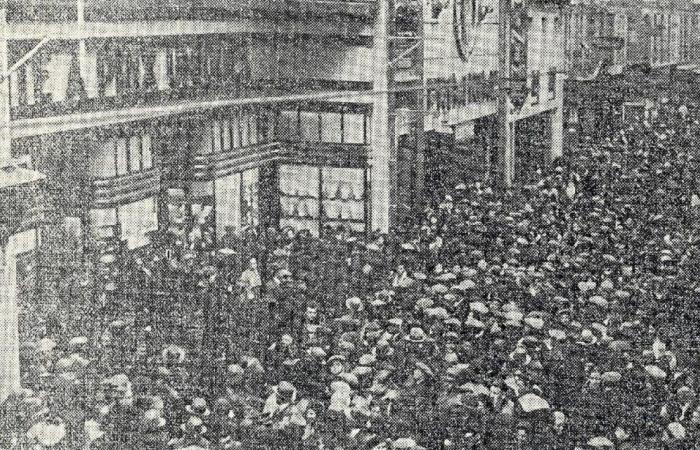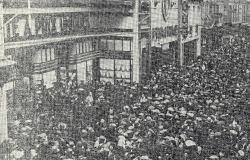
Traders in the city center of Brest are railing in particular, in this year 2024, against the consequences of the work on the second tram line and that of the high-level bus line, against the rise in prices, against online commerce… But their predecessors? The first tramway, at the end of the 19th century, was seen as a source of progress and it does not seem that the traders of the time complained about its installation work. But other subjects will worry them later.
The fear of the department store
This is evidenced by this “blood stroke of March 24, 1934, the opening day of Monoprix, with its unique prices,” says Gilles Cardinal, tireless archive searcher. The committee for the defense of small businesses, behind Auguste Lombard, distributed leaflets calling for demonstrations. The crowd, customers and merchants, crowds in front of the store, rue de Siam. “The police intervene to try to get the troublemakers out. Blows are exchanged, a table of sweets is overturned, underwear on display is thrown and spread out all over the place and glass shelves broken,” recounts the local history enthusiast on his blog Chroniques de Brest et du Léon.
“They had the feeling that the store was going to cut prices, with doubts about the origin of the merchandise,” he said this week. The next day, the chairman of the board of directors of Monoprix published a full-page prospectus in La Dépêche de Brest on March 26. “Of the 7,824 items put up for sale, 7,795 are of French production, made exclusively by French workers,” he writes. He does not file a complaint.
They can rent cheaper than us and our establishments are almost empty
An Airbnb-style controversy?
Unfair competition is also what hoteliers criticized individuals a few years earlier. “Since the 19th century, Brest has lacked housing,” recalls Gilles Cardinal. “Individuals were authorized to rent slums, cellars, rooms without openings… Garnished rooms (we would say furnished rooms today) for individuals or prostitutes, by the night, by the month or by the year. In 1921, hoteliers strongly protested against these places which did not pay taxes, unlike them. A period document quotes them in fact: “Having none of the tax burdens that fall to us, they can rent cheaper than us and our establishments are almost empty”. Compare with the current controversies over Airbnb accommodation…
Fight against the high cost of living in 1920
At the same time, in 1920, there was a fight against the high cost of living. At the end of the First World War, prices rose. “Coal increased fourfold between 1910 and 1920,” notes Gilles Cardinal. “The price of butter, eggs, milk… Housewives are angry and don’t know what to do. The drop in purchasing power has repercussions on businesses.”
But the oldest occurrence that our interlocutor speaks about is the fight against alcoholism under the Second Empire. “The ministerial circular of March 18, 1851 triggered a vast campaign aimed at eradicating “the disorders, scandals, and immorality of which these places are frequently the scene.” In Brest, as in Recouvrance, the closures of bars and cabarets continued for twenty years,” he notes. “But faced with the drop in tax revenues, the authorities let go a little and general councilors wanted to revive the wine trade in Brest.”





